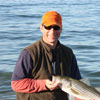5 Simple Ways to Prevent Water Pollution
By Tom Keer
Jul 27, 2016
Clean boating practices can significantly minimize the pollutants that affect water quality. Try a few simple methods to help facilitate clean water so there are more fish to catch!
It's summer, the weather is fine, and it's time to get outdoors to boat and to fish. A couple of quick checks will help reduce water pollution, which means that there will be clean water with more fish to catch.
How to Prevent Water Pollution
1. Rinse it clean. Hulls get dirty, there is no question about that. If you use any of the caustic chemicals to get rid of the algae and scum, then be sure to thoroughly clean your hull before you splash. Wash and rinse a few times in your driveway or thoroughly clean in the do-it-yourself section of a car wash. Or, solve the issue completely by using an environmentally-friendly boat cleaner.
2. The hose knows. Check your hoses for leaks. Rubber deteriorates over time, and oil and gas spills in self-bailing boats can run into the water. On larger boats, leaks from steering cables or oil and gas hoses wind up in the bilge and then become water pollution.
3. Chewing up the bottom. Running in skinny water is a lot of fun, particularly if you're on your way to sight fish. That said, spinning props in eel grass beds chew 'em up. Trim your outboard or, better yet, go with an electric motor or a push pole. The latter are stealthier anyway, and you won't spook the fish.
4. Paint your hull green. Chipped bottom paint pollutes the water. When you need to freshen your paint, go green. I don't mean the specific color (unless it looks good). By green I mean an environmentally-friendly bottom paint. Newer antifouling paints are designed to harm the barnacles and not the water, so they're an effective and environmentally safe way to go.
5. Trash compactor. When the bite is hot it's common to have garbage scattered around your boat. Try keeping a throw bucket on board, and toss chewed up soft-plastics, tangled fishing line and soda cans inside. Keep it contained and it won't blow overboard when the wind gusts. Post-fishing clean-up is a whole lot easier.
Clean water is healthy water, and if we all do our part then we'll be in ship shape.
How to Prevent Water Pollution
1. Rinse it clean. Hulls get dirty, there is no question about that. If you use any of the caustic chemicals to get rid of the algae and scum, then be sure to thoroughly clean your hull before you splash. Wash and rinse a few times in your driveway or thoroughly clean in the do-it-yourself section of a car wash. Or, solve the issue completely by using an environmentally-friendly boat cleaner.
2. The hose knows. Check your hoses for leaks. Rubber deteriorates over time, and oil and gas spills in self-bailing boats can run into the water. On larger boats, leaks from steering cables or oil and gas hoses wind up in the bilge and then become water pollution.
3. Chewing up the bottom. Running in skinny water is a lot of fun, particularly if you're on your way to sight fish. That said, spinning props in eel grass beds chew 'em up. Trim your outboard or, better yet, go with an electric motor or a push pole. The latter are stealthier anyway, and you won't spook the fish.
4. Paint your hull green. Chipped bottom paint pollutes the water. When you need to freshen your paint, go green. I don't mean the specific color (unless it looks good). By green I mean an environmentally-friendly bottom paint. Newer antifouling paints are designed to harm the barnacles and not the water, so they're an effective and environmentally safe way to go.
5. Trash compactor. When the bite is hot it's common to have garbage scattered around your boat. Try keeping a throw bucket on board, and toss chewed up soft-plastics, tangled fishing line and soda cans inside. Keep it contained and it won't blow overboard when the wind gusts. Post-fishing clean-up is a whole lot easier.
Clean water is healthy water, and if we all do our part then we'll be in ship shape.
Popular Posts









